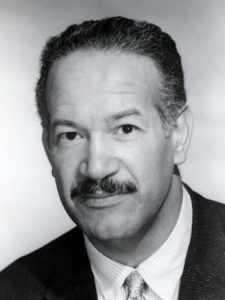
Frank Silvera
Frank Silvera was born on this date in 1914. He was a Black actor.
He was born in Kingston, Jamaica, moved to the United States with his family, where he grew up, and attended Boston Public Schools.
After graduation, Silvera moved to New York City, where he launched his acting career. He joined the American Negro Theatre in Harlem and got a part in the play "Anna Lucasta," which played successfully on Broadway and in London. Silvera was present at the beginning of a new era for Blacks in American theatre. He worked with Ossie Davis, Alice Childress, Ruby Dee, Sidney Portier, Maxwell Granville, Hilda Simms, Harry Belafonte, Stanley Green, Claudia McNeil, Diana Sands, Louise Stubbs, Isabel Cooley, Gertrude Jeannette, and a host of others, who entered the new American theatre scene.
Due to his looks, language skill, and ability to transcend color, Silvera moved into the new elite inner circles of the leading American theatre groups, where he became an active member of the Actors' Studio of New York.
Almost no one in the audience realized he was Black when he played the Italian father of characters Ben Gazzara and Anthony Franciosa portrayed in the Broadway hit play, "A Hatful Of Rain." Actress Shelley Winters knew, as did Harry Guardino and Steve McQueen, an understudy actor in the production. It had been rumored that Frank helped to save his job during a dispute backstage. Actors Marlon Brando, George C. Scott, Estelle Parsons, Geraldine Page, Lou Gilbert, Rip Torn, Paul Newman, Lonny Chapman, Lee Grant, Jimmy Dean, along with directors Elia Kazan, Arthur Penn, Lee Strausberg, Anna Strausberg, and the vast majority of the Actors' Studio members, all knew very well that he was Black. Still, they either did not mention it, or it did not matter.
More importantly, he could play practically any role or character given to him. Silveras’ credits include Tennessee Williams’ Camino Real, James Baldwin's The Amen Comer, King Lear, and many others. He produced, directed, and was featured on television in the western series High Chaparral. During the 1960s, Silvera conducted acting workshops at the Coronet Theatre of La Cienega Boulevard in Hollywood and a Writers' Workshop at the Martinique Theatre in New York.
In June 1970, Frank Silvera died in a strange accident at his house in Pasadena, CA. According to the reports, he was killed while repairing the electric garbage disposal unit in his kitchen sink. Frank Silvera is buried in East Elmhurst, Queens, New York.
Schomburg Center for Research in Black Culture
515 Malcolm X Boulevard
New York, NY 10037-1801
(212) 491-2200